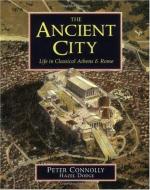
|
| Name: _________________________ | Period: ___________________ |
This test consists of 15 multiple choice questions and 5 short answer questions.
Multiple Choice Questions
1. What is the only crime in Athens for which a woman can divorce her husband?
(a) Adultery.
(b) Continued abuse.
(c) Theft.
(d) Murder.
2. This is the amount sculptors are paid per sculpture for working on the sculptures from the Erechtheum.
(a) 6000 drachmae.
(b) 60 drachmae.
(c) 100 drachmae.
(d) 1000 drachmae.
3. In 487 BC, laws are passed that dictate candidates for archonship must be chosen in this manner, instead of being elected.
(a) By assembly.
(b) By chance.
(c) By an election of kings.
(d) By lot.
4. Hades is the god of this.
(a) The Underworld.
(b) The Sea.
(c) Prophecy.
(d) Athens.
5. This event consists of discus, long jump, javelin, sprinting, and wrestling.
(a) Panathenaic.
(b) Panhellenic.
(c) Triada.
(d) Pentathlon.
6. ___________ is credited with building the first stage.
(a) Hermes.
(b) Thespis.
(c) Pericles.
(d) Xerxes.
7. What do many Athenians do to unwanted children?
(a) Abort them.
(b) Give them up for adoption.
(c) Murder them.
(d) Expose them to the elements to die.
8. Who serve as police officers, in a sense, in Athens?
(a) Public slaves.
(b) Women.
(c) Men of the military.
(d) Young men before they are of age to join the military.
9. The first king of Athens is ________, who establishes worship of the Greek gods.
(a) Xerxes.
(b) Pisistratus.
(c) Erechtheus.
(d) Theseus.
10. In 480 BC, a huge army under this Persian king breaks through the Spartan army at Thermopylae, and attacks Athens.
(a) Pisistratus.
(b) Themistocles.
(c) Xerxes,
(d) Erechtheus.
11. This festival held every summer to honor Athena is called this.
(a) Pentatrithon.
(b) Pentalthelon.
(c) Pentalia.
(d) Panathenaea.
12. Most houses have lavatories, consisting of these.
(a) Seat and bucket.
(b) Chamber pot and running water.
(c) Clay vases and seats.
(d) Toilet and running water.
13. To stave off future attacks, the Athenians build this to help protect their city.
(a) A bridge.
(b) A cannon.
(c) A large gunship.
(d) A wall.
14. Much of the Greek clothing is made from this.
(a) Leaves.
(b) Wool.
(c) Cotton.
(d) Animal hair.
15. These objects are sparse, and generally made of wood.
(a) Window frames.
(b) Furniture.
(c) Bathtubs.
(d) Doorways.
Short Answer Questions
1. The ekklesia in fifth century Athens is the _________.
2. How many members are there in the boule?
3. This person is the first to do a dramatic reading, thereby beginning the Greek drama.
4. The Patron God of Athens is _________.
5. A great statue of this goddess stands inside the west end of the central isle of the Parthenon.
|
This section contains 363 words (approx. 2 pages at 300 words per page) |

|




